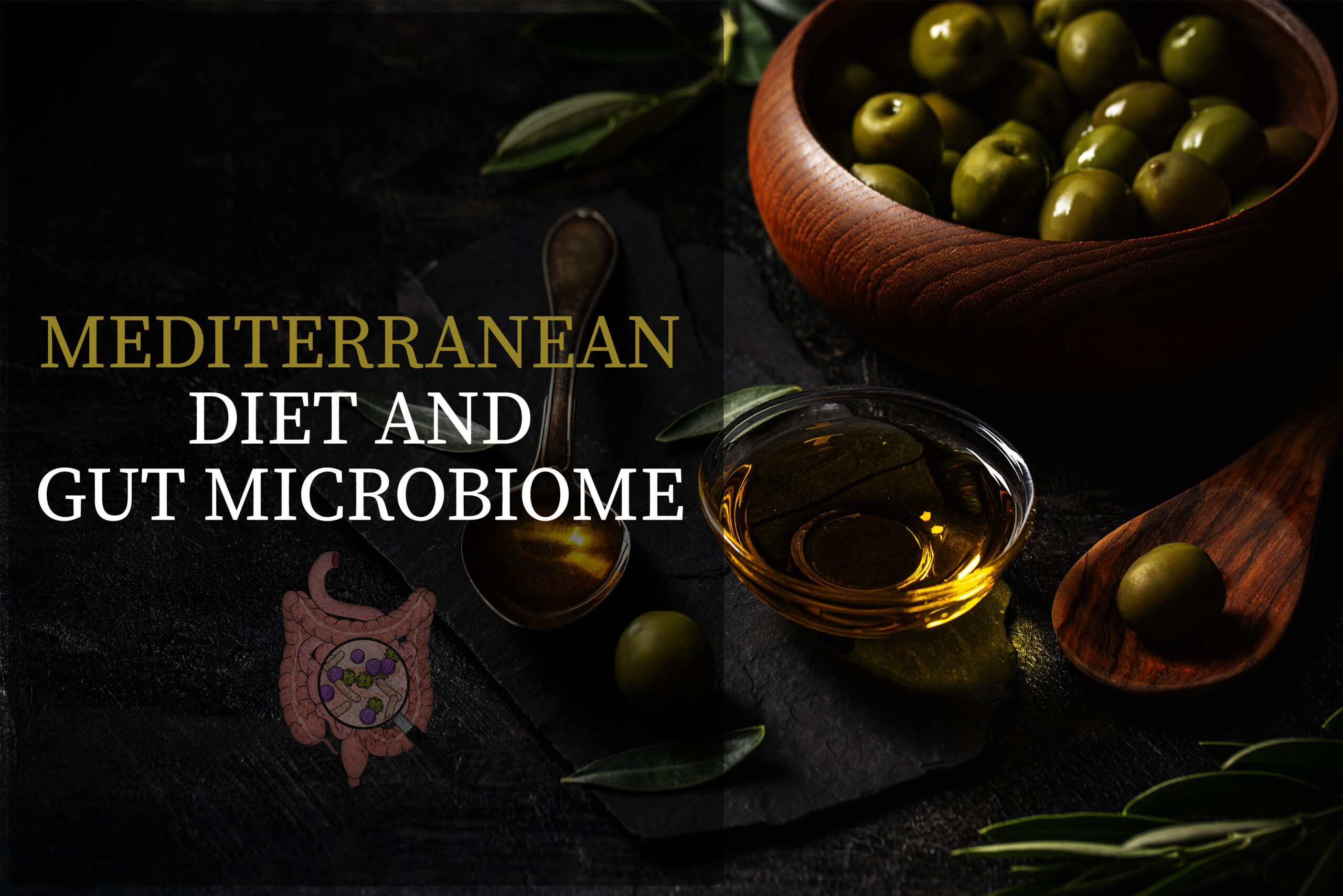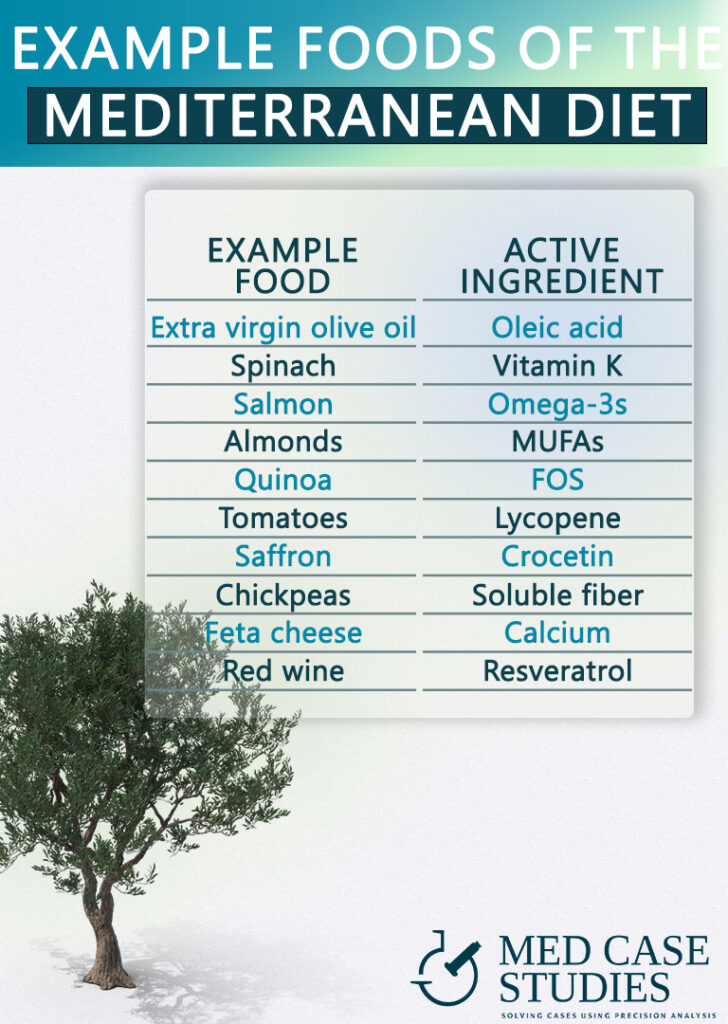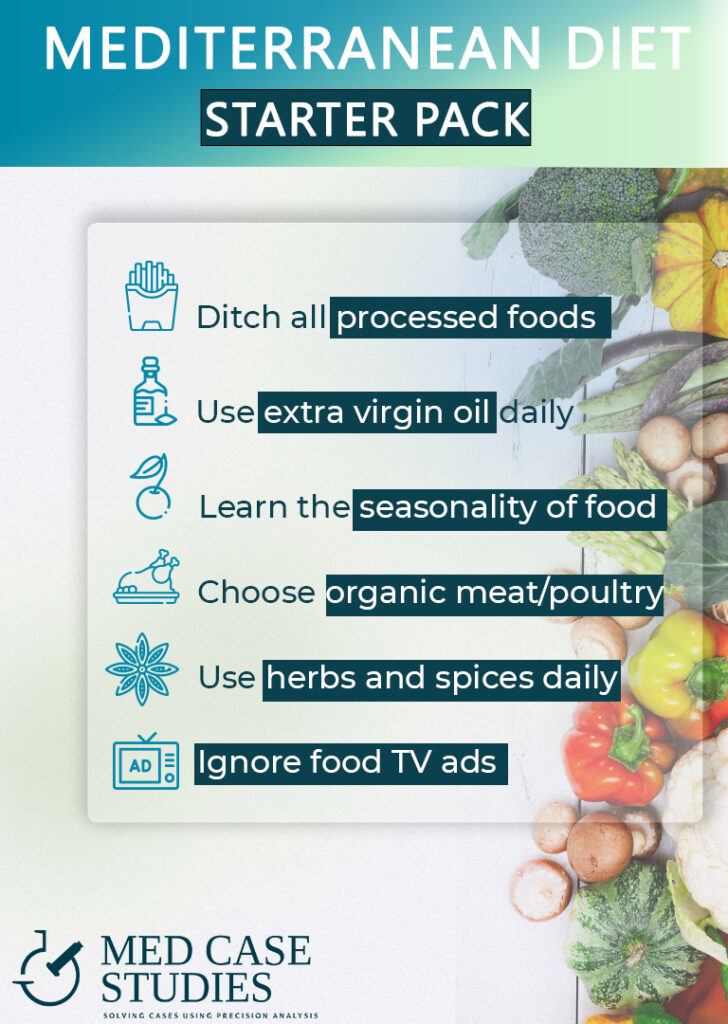The Mediterranean Diet and gut microbiome: A winning combination

The Mediterranean Diet (MD) is a popular dietary pattern that has its roots in the traditional culinary practices of countries surrounding the Mediterranean Sea. This time-honored dietary approach emphasizes whole, minimally processed foods, including fruits, vegetables, whole grains, legumes, nuts, seeds, and olive oil, with moderate amounts of fish, dairy, and poultry, and limited red meat and sweets. While the modern MD may differ from the traditional Paleo-Mediterranean diet by including more sugar, starch, and processed foods, and less seasonal variation, it still offers numerous health benefits.
What makes the mediterranean diet so special?

Dietary wholesomeness
One of the key factors that make this diet so special is its emphasis on wholesome, nutrient-dense ingredients. Fruits, vegetables, whole grains, legumes, nuts, seeds, and olive oil form the foundation of this eating pattern. These foods are packed with vitamins, minerals, antioxidants, and dietary fiber, which contribute to overall health and well-being. Moderate amounts of fish, rich in omega-3 fatty acids, support heart health, while poultry and dairy provide essential nutrients like protein and calcium. Red meat and sweets are consumed sparingly, minimizing the intake of saturated fats and added sugars.
Unique Mediterranean climate
The Mediterranean region enjoys a unique climate, characterized by hot, dry summers and mild, wet winters. This climate allows for a consistent supply of fresh, locally-grown ingredients throughout the year. The abundance of sunshine helps produce fruits and vegetables with vibrant colors and flavors, while the region’s fertile soil nurtures healthy plants. This combination of climate and soil conditions ensures the availability of high-quality ingredients that are rich in nutrients and full of flavor.
Mediterranean soil
The Mediterranean soil is also rich in minerals, such as calcium and magnesium, which contribute to the nutritional value of the foods grown in the region. Furthermore, the proximity of the Mediterranean Sea provides an abundant supply of fresh fish and seafood, which are integral components of the diet.
Social interactions around diet
In addition to its focus on nutritious ingredients, the MD encourages social and cultural practices that contribute to its appeal. Meals are often shared with family and friends, fostering a sense of community and promoting mindful eating. The use of traditional cooking methods, such as grilling, roasting, and stewing, helps preserve the nutrients in the ingredients while enhancing their flavors.
Food | Active ingredient (one of many) |
|---|---|
Extra virgin oil | Oleic acid |
Spinach | Vitamin K |
Salmon | Omega-3 fatty acids |
Almonds | Monounsaturated fats |
Quinoa | Dietary fiber |
Cherry tomatoes | Lycopene |
Chickpeas | Soluble fiber |
Feta cheese | Calcium |
Red wine (in moderation) | Resveratrol |
How are the benefits of the Mediterranean Diet mediated by the gut microbiome?
The gut microbiome refers to the diverse community of microorganisms living in our intestines, playing a crucial role in digestion, immune function, and overall health. Recent research has revealed that adherence to a Mediterranean diet I associated with increased microbiome diversity.
Specific ingredients of the Mediterranean Diet, such as dietary fibers from whole grains, fruits, and vegetables, as well as polyphenols found in olive oil, nuts, and red wine, drive the modulation of the intestinal microbiome. These components serve as fuel for beneficial bacteria, promoting their growth and activity. In turn, these bacteria produce short-chain fatty acids (SCFAs) like butyrate, acetate, and propionate and metabolites, like vitamins and cofactors.
Moreover, the MD’s plant-based foods are rich in bioactive compounds that may inhibit the growth of harmful microbes, further enhancing the balance of our gut microbiota. By maintaining a healthy gut microbiome through adherence to a Mediterranean diet, we can reduce inflammatory indices, lower cholesterol, and decrease the risk of various health issues, such as type 2 diabetes and cardiovascular disease.
Nutrient | Effect on gut microbiome |
|---|---|
Polyphenols | Stimulate growth of Lactobacillus and Bifidobacterium (anti-inflammatory) |
Insoluble fiber | Increases microbial production of SCFAs by Bacteroides spp. (anti-inflammatory) |
Omega-3 fatty acids | Enhances the abundance of Akkermansia muciniphila (improves gut barrier) |
Prebiotic fibers | Promotes growth of Bifidobacterium spp. (digestive health) |
Resistant starch | Increases SCFAs production by Prevotella spp. (energy source for colonocytes) |
GOS | Increases beneficial Bifidobacterium spp. and Lactobacillus spp. (digestive health) |
Probiotics | Introduces Lactobacillus spp. and Streptococcus thermophilus (supports gut balance) |
Resveratrol | Enhances growth of Bacteroides spp. and Lactobacillus spp. (cardiometabolic health) |
Inulin | Promotes growth of beneficial gut bacteria (digestive health and immune support) |
Can the Mediterranean Diet help reduce inflammation and promote human health
The gut microbiome is intricately linked to inflammation and overall human health. A well-balanced gut microbial community can help reduce inflammatory processes, while imbalances or dysbiosis can lead to chronic inflammatory processes, increasing the risk of various health issues. By supporting a healthy microbiome, the Mediterranean Diet (MD) may help reduce inflammation and promote human health.
Several studies have demonstrated the anti-inflammatory effects of the Mediterranean Diet. For example, a randomized controlled trial called PREDIMED (Prevención con Dieta Mediterránea) showed that high adherence to the Mediterranean dietary principles was associated with a significant reduction in the risk of developing cardiovascular disease, type 2 diabetes, and certain cancers. This is partly attributed to the diet’s impact on the gut microbiome composition, promoting the growth of beneficial bacteria that produce anti-inflammatory compounds like short-chain fatty acids (SCFAs).
Additionally, the MD is rich in anti-inflammatory nutrients such as omega-3 fatty acids from fish and nuts, polyphenols from olive oil and red wine, and antioxidants from fruits and vegetables. These nutrients not only help to modulate gut microbiota but also directly contribute to the reduction of oxidative stress in the body.
How the dietary principles of the Mediterranean Diet apply to Ulcerative Colitis
Another important aspect of the Mediterranean Diet is its potential to reduce the long-term risk of ulcerative colitis (UC), a chronic inflammatory bowel disease that affects the lining of the large intestine. The microbiome plays a crucial role in the pathogenesis of UC, and adherence to a Mediterranean dietary pattern has been shown to positively influence the human gut microbiota.
The gene NOD2 (nucleotide-binding oligomerization domain-containing protein 2) has been implicated in the development of UC. NOD2 is involved in the recognition of bacterial components and activation of the immune system. Mutations in this gene have been associated with an increased susceptibility to UC, possibly due to impaired recognition of microbial components and subsequent dysregulation of the immune response. Research has shown that the Mediterranean Diet can help modulate gut microbial diversity, promoting a healthy balance of bacteria that may modulate inflammatory pathways and protect the intestinal mucosa.
The benefits of the Mediterranean Diet for the human gut ecology are largely due to the abundance of dietary fiber, polyphenols, and other bioactive compounds found in its plant-based foods. These nutrients promote the growth of beneficial bacteria in the gut, which in turn produce health-promoting postbiotics, such as short-chain fatty acids (SCFAs). SCFAs, including butyrate, acetate, and propionate, have been shown to play a crucial role in maintaining intestinal barrier integrity and reducing inflammation in the gut.
In European countries where adherence to the Mediterranean Diet is high, the incidence of UC has been reported to be lower than in countries with a more Westernized and sugar-loaded dietary pattern. This association suggests that the Mediterranean Diet may offer a protective effect against UC, possibly through its positive influence on the gut microbiome.
Moreover, the Mediterranean Diet has been associated with a reduced risk of frailty in older adults, which is particularly relevant for individuals with UC who may be more susceptible to malnutrition and muscle wasting. The diet’s rich array of plant-based foods, high in all sorts of fiber, polyphenols, and other bioactive compounds, supports a diverse and balanced gut microbiota. This, in turn, promotes the production of health-promoting postbiotics, such as SCFAs, which help maintain intestinal barrier integrity and reduce inflammation. By adhering to a Mediterranean Diet, individuals may be able to positively influence their gut microbiome, reduce inflammation, and potentially lower their risk of developing ulcerative colitis.

How can you incorporate the benefits of the Mediterranean Diet into everyday life?

- Ditch all processed foods: Western Diet is packed with processed foods that often contain additives, preservatives, and unhealthy amounts of sugar, salt, and unhealthy fats. This pattern alters the gut microbiome composition, leading to inflammatory processes and various health issues beyond bowel diseases. Embracing the Mediterranean Diet means replacing processed foods with whole, natural ingredients that support a healthy gut and overall well-being. By eliminating processed foods from your diet, you’ll be nourishing your body with the nutrients it needs to thrive and maintain a balanced intestinal microbiota.
- Use plenty of extra virgin olive oil: Extra virgin olive oil is a staple in the Mediterranean Diet, known for its high content of heart-healthy monounsaturated fats and antioxidant-rich polyphenols. Incorporating this oil into your daily meals can help reduce inflammatory indices, support a healthy microbiome, and lower your risk of chronic diseases. Use it for cooking, drizzling over salads, or dipping with whole-grain bread for a flavorful and health-promoting addition to your meals.
- Learn the seasonality of vegetables and fruits: Consuming seasonal produce ensures that you are eating the freshest, most nutrient-dense fruits and vegetables available. Seasonal produce often contains higher levels of vitamins, minerals, and antioxidants, which can help support healthy gut microbiota composition and reduce disease risk. By learning the seasonality of various produce items, you’ll be able to incorporate diverse, flavorful, and health-promoting ingredients into your Mediterranean-inspired meals throughout the year.
- Eat only organic meat and poultry: The Mediterranean Diet emphasizes moderate consumption of lean meats and poultry. Choosing organic options can help reduce your exposure to hormones, antibiotics, and other harmful substances that can negatively impact your gut microbiome and overall health. By opting for organic, you’re also supporting sustainable farming practices that prioritize animal welfare and environmental health.
- Use herbs and spices every chance you have: Herbs and spices not only add flavor and depth to your meals, but they also offer a range of health benefits. Many herbs and spices possess antioxidant and anti-inflammatory properties that can support a healthy gut microbiome and overall well-being. Incorporate herbs like basil, oregano, and rosemary, and spices like turmeric, cinnamon, and paprika into your Mediterranean-inspired dishes to enhance their flavor and health-promoting properties.
- Treat food TV commercials like politicians; They lie: Food advertisements can be misleading, often promoting unhealthy and processed foods that do not align with the principles of the Mediterranean Diet. By being skeptical of food commercials and educating yourself on the principles of the Mediterranean Diet, you can make informed choices about the foods you consume. Focus on building your diet around whole, nutrient-dense foods, and rely on reputable sources of information to guide your decisions on what to eat for optimal gut health and overall well-being
Conclusion: The Mediterranean Diet and a healthy gut
In conclusion, the Mediterranean Diet is an effective dietary pattern that not only benefits overall human health but also supports a healthy human gut microbiome. By understanding the characteristics of the Mediterranean Diet and how it differs from the Paleo-Mediterranean, we can appreciate its continued relevance today. Incorporating the main ingredients of the Mediterranean Diet into our meals allows us to benefit from their unique health-promoting properties. Moreover, scientific evidence shows that the Mediterranean Diet has a positive impact on the gut microbiome, reducing inflammation and promoting overall health.
However, it is essential to recognize that adherence to the Mediterranean Diet is just one part of the Mediterranean way of life, which is associated with longevity and wellness. This lifestyle encompasses various elements that contribute to overall well-being, including reduced stress, mindful eating, exposure to sunlight, early dinners, strong social connections, and positive outward behavior.
- Reduced stress: The Mediterranean lifestyle places a strong emphasis on stress reduction and relaxation. Chronic stress has been linked to numerous health issues, including chronic inflammatory diseases, heart disease, and depression. By managing stress through relaxation techniques such as meditation, deep breathing, and yoga, we can support our mental and physical well-being. Scientific studies have shown that stress management practices can lower cortisol levels, a hormone responsible for the “fight or flight” response, and promote overall health.
- Mindful eating: The Mediterranean way of life promotes mindful eating, where individuals savor each bite and focus on the flavors and textures of their food. This practice can help regulate appetite, reduce overeating, and improve digestion. Research has shown that mindful eating can positively impact hormones such as ghrelin and leptin, which regulate hunger and satiety, respectively.
- Exposure to sunlight: Adequate sunlight exposure is vital for our bodies to produce vitamin D, an essential nutrient for bone health and immune function. The Mediterranean lifestyle encourages spending time outdoors, soaking up the sun’s rays in moderation. Studies have found that vitamin D plays a role in maintaining a healthy gut microbiome, modulating inflammation, and supporting overall well-being.
- Early dinners: The Mediterranean lifestyle also emphasizes the importance of early dinners, which can improve digestion and promote better sleep. Eating dinner earlier in the evening allows the body ample time to digest food before bedtime, reducing the risk of gastrointestinal discomfort and sleep disturbances. Research has shown that eating earlier in the evening can help regulate circadian rhythms and promote overall health.
- Social connections: Strong social connections are a hallmark of the Mediterranean way of life. These connections contribute to a sense of belonging and emotional well-being. Studies have shown that social support can boost mood, improve immune function, and promote longevity by reducing the risk of chronic diseases.
- Outward behavior: The Mediterranean lifestyle encourages positive outward behavior, such as kindness, generosity, and gratitude. These behaviors have been linked to better mental health and well-being. Research has demonstrated that engaging in positive outward behaviors can increase oxytocin levels, a hormone responsible for feelings of trust, bonding, and social connection, contributing to overall happiness and longevity.
- By incorporating the Mediterranean Diet into your life and adopting the various aspects of the Mediterranean lifestyle, you can support a healthy gut microbiome, and promote overall well-being. Embrace the power of the Mediterranean Diet and lifestyle, and take charge of your health today.
Nagpal, Ravinder, et al. “Gut microbiome-Mediterranean diet interactions in improving host health.” F1000Research 8 (2019).

With a background in Chemistry and Biochemistry from the National and Kapodistrian University of Athens, Theodoros brings a wealth of knowledge in functional medicine and advanced treatments to his role. He possesses exceptional skills in analysis, pattern recognition, diagnostic translation, and storytelling. He is also FMU certified in Functional Medicine and has received training in advanced treatments from the Saisei Mirai Clinic in Japan.


